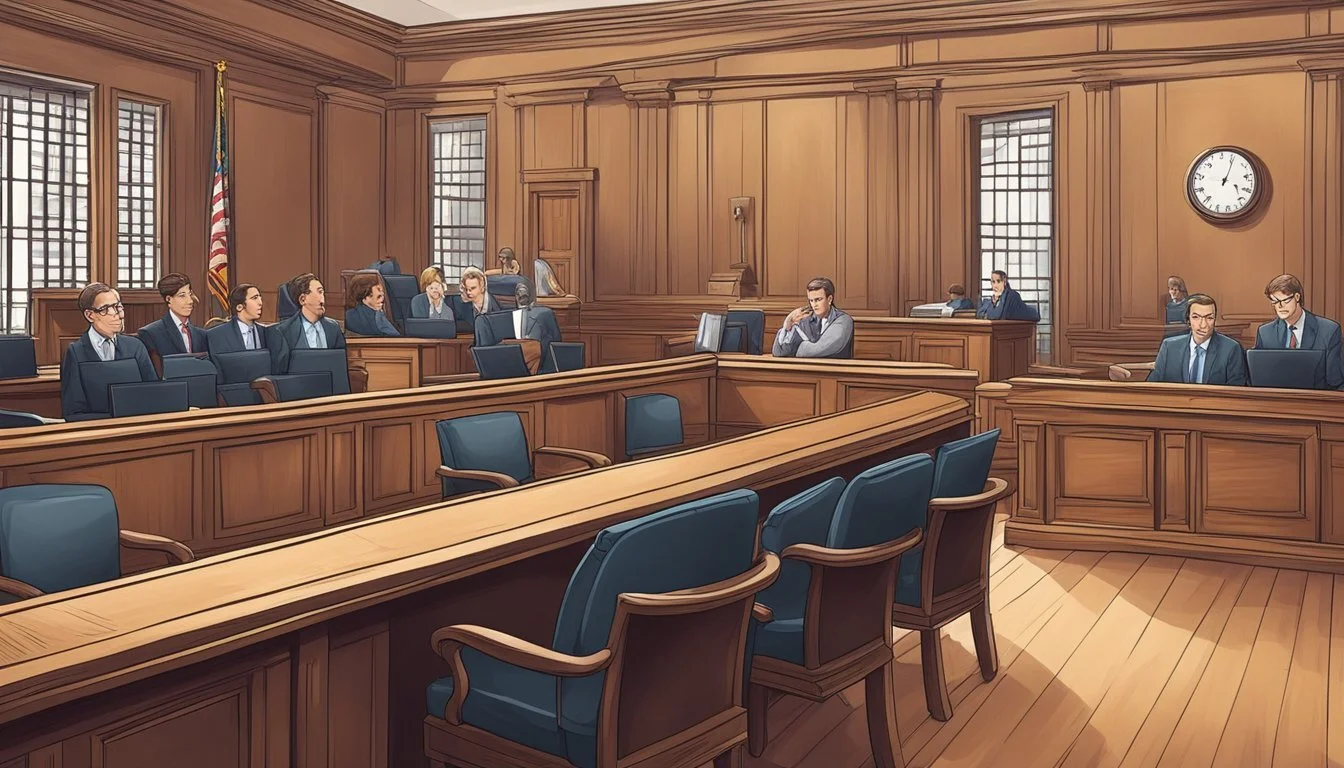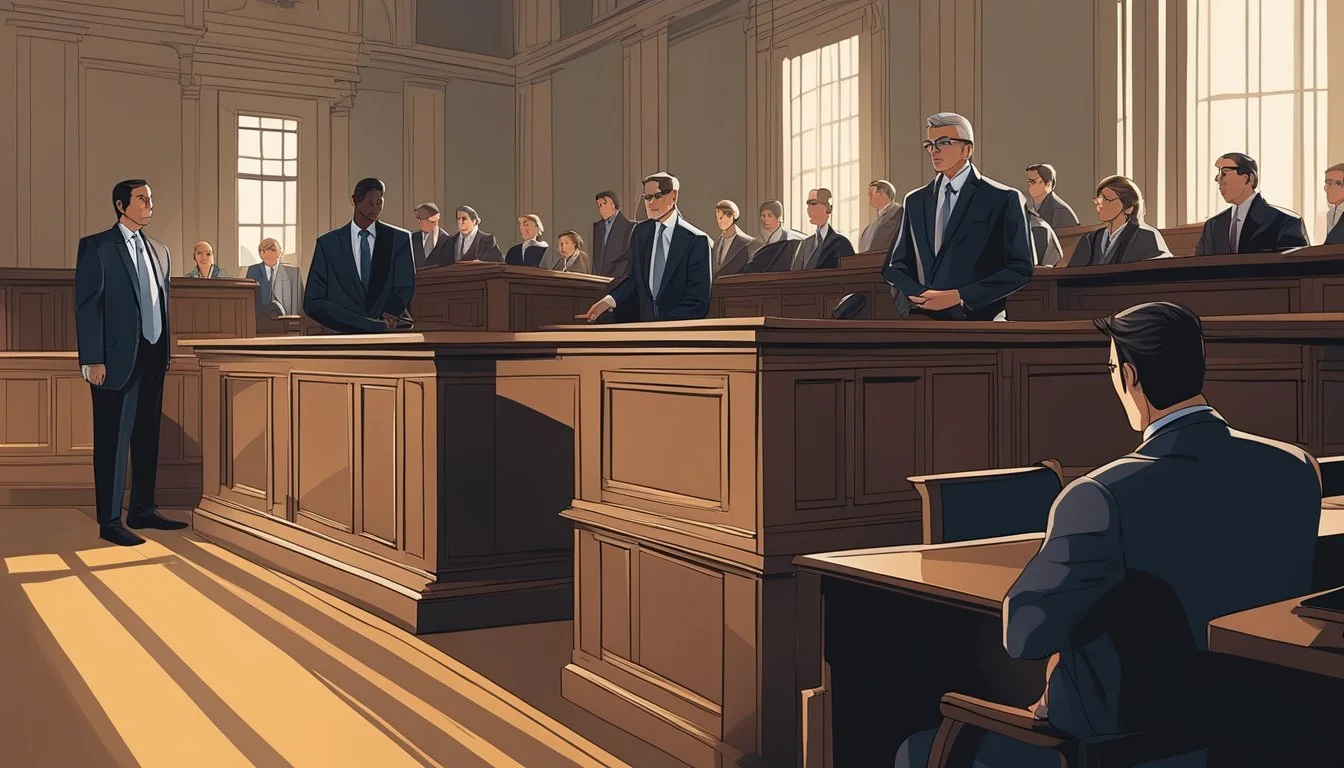9 Ways Psychopaths Manipulate in the Courtroom
Legal Tactics Exposed
Psychopaths in the courtroom can be formidable adversaries. Their manipulative tactics and lack of empathy allow them to navigate legal proceedings with a cunning that often catches others off guard. I've observed how these individuals employ various strategies to gain advantages, from exploiting procedural loopholes to manipulating emotions.
Understanding the methods psychopaths use in court is crucial for those involved in legal matters. By recognizing their tactics, lawyers, judges, and other participants can better prepare and respond effectively. This knowledge can level the playing field and help ensure fairer outcomes in legal proceedings involving psychopathic individuals.
1) Gaslighting witnesses
Psychopaths often employ gaslighting tactics to manipulate witnesses in the courtroom. I've observed how they skillfully distort reality and sow seeds of doubt in witnesses' minds.
One common technique is challenging a witness's memory. The psychopath might confidently state, "That's not what happened," even when faced with clear evidence to the contrary.
They may also use subtle language to undermine a witness's confidence. Phrases like "Are you sure about that?" or "I think you're confused" can make witnesses second-guess themselves.
Psychopaths might strategically present conflicting information to create confusion. This tactic can leave witnesses feeling unsure about their own recollections of events.
I've noticed that some psychopaths excel at feigning concern for a witness's mental state. They might suggest that stress or trauma has affected the witness's memory, further eroding their credibility.
In cross-examinations, psychopaths often use rapid-fire questioning to overwhelm witnesses. This technique can make it difficult for witnesses to maintain their composure and recall details accurately.
2) Feigning incompetence
Psychopaths often employ the tactic of feigning incompetence in courtroom settings. I've observed this behavior firsthand during trials. They may pretend not to understand questions or legal procedures, appearing confused or forgetful.
This act serves multiple purposes. It can delay proceedings, frustrate prosecutors, and potentially gain sympathy from judges or jurors. I've seen defendants suddenly struggle with basic concepts they previously grasped.
In some cases, psychopaths might even fake cognitive limitations during competency evaluations. This tactic aims to avoid trial altogether or secure a more lenient sentence. However, courts are becoming more aware of this manipulation.
Experienced legal professionals can often detect these acts of feigned incompetence. Inconsistencies in behavior or sudden changes in cognitive abilities may raise red flags. Still, it remains a challenging issue for the justice system to address.
Ultimately, this manipulation tactic underscores the importance of thorough psychological evaluations and vigilant courtroom observation. Recognizing these behaviors is crucial for ensuring fair legal proceedings.
3) Creating doubt
Psychopaths excel at sowing seeds of doubt in the courtroom. They employ subtle tactics to undermine witness credibility and cast uncertainty on evidence presented against them.
I've observed psychopaths skillfully exploit inconsistencies in testimonies, no matter how minor. They seize on these details to suggest witnesses are unreliable or lying.
Psychopaths also manipulate perceptions by offering alternative explanations for incriminating evidence. They present plausible scenarios that introduce reasonable doubt about their guilt.
In cross-examinations, psychopaths use leading questions and twisting of words to confuse witnesses. This can make even confident witnesses appear unsure, damaging their credibility.
I've seen psychopaths leverage their charm to gain sympathy from jurors. They portray themselves as misunderstood victims of circumstances, creating doubt about their capability for wrongdoing.
By strategically withholding or distorting information, psychopaths can paint an incomplete picture. This selective presentation of facts often leaves jurors uncertain about the full truth.
4) Emotional manipulation
Psychopaths excel at emotional manipulation in the courtroom. I've observed them using various tactics to sway judges, jurors, and witnesses. They often feign remorse or victimhood to garner sympathy.
These individuals may shed crocodile tears or display exaggerated gestures of distress. They aim to create an emotional connection with the court, hoping to influence decisions in their favor.
Psychopaths might also attempt to provoke emotional responses from others. They may make subtle jabs or use loaded language to upset their opponents, potentially causing outbursts that damage credibility.
I've seen psychopaths exploit personal relationships in court. They might bring up past traumas or shared experiences to manipulate former partners or family members into supporting their version of events.
Another tactic involves rapid mood swings. Psychopaths can quickly shift from appearing calm and collected to seeming distraught or angry. This unpredictability can unsettle others and control the emotional atmosphere of the courtroom.
5) Using charm offensively
Psychopaths often deploy their charm as an offensive weapon in courtroom settings. I've observed how they can quickly establish rapport with judges, jurors, and other key figures through their superficial charisma.
These individuals excel at reading people and tailoring their demeanor to appear likable and trustworthy. They may use flattery, humor, or displays of vulnerability to disarm others and gain sympathy.
In cross-examinations, psychopaths can charm witnesses into revealing more information than intended. Their persuasive abilities may sway jurors' perceptions, even in the face of damaging evidence.
I've seen psychopathic defendants maintain a charismatic facade throughout trials, smiling and engaging positively with courtroom staff. This can create cognitive dissonance for observers, making it difficult to reconcile their charm with alleged crimes.
It's important to recognize that this charm is a calculated tactic. Psychopaths leverage it strategically to manipulate perceptions and outcomes in their favor, often catching less prepared individuals off guard in the courtroom environment.
6) Distorting facts
Psychopaths are masters at distorting facts in the courtroom to serve their own agenda. I've observed them skillfully twisting information to create doubt and confusion. They may present partial truths or omit key details to paint a misleading picture.
These manipulators often reframe events in ways that absolve them of responsibility. They might claim their actions were justified or blame others for the consequences. I've seen psychopaths confidently state outright falsehoods, banking on their ability to sell the lie.
They excel at muddying timelines and sequences of events. By jumbling up chronology, they make it harder for others to piece together what really happened. Psychopaths may also exaggerate or minimize certain aspects of a situation to suit their narrative.
I've noticed they tend to exploit any ambiguity or lack of concrete evidence. They fill in gaps with fabricated details that support their version of events. Their goal is to create enough uncertainty to escape accountability.
7) Exploiting legal loopholes
Psychopaths are adept at finding and exploiting legal loopholes to their advantage in court. I've observed them poring over laws and regulations, searching for any technicality they can use.
They may find obscure precedents or interpretations that support their case, even if it goes against the spirit of the law. Psychopaths have no qualms about twisting the legal system to serve their own ends.
I've seen them use procedural rules to delay proceedings or exclude key evidence. They might file frivolous motions or appeals just to drag out the process and wear down the other side.
Some psychopaths exploit jurisdictional issues or conflicts between different laws. They look for any ambiguity they can leverage to their benefit. Their goal is often to confuse and frustrate the court.
I've witnessed psychopaths take advantage of time limits, filing deadlines, and other procedural requirements. They may deliberately withhold information until the last possible moment to catch opponents off guard.
Their manipulative nature allows them to present persuasive but misleading arguments about how laws should be interpreted. They excel at muddying the waters around legal issues.
8) Feigning remorse
Psychopaths in courtrooms often put on a show of remorse to manipulate the proceedings in their favor. I've observed this tactic firsthand during trials. They may shed tears, express regret, or claim they've changed.
These displays are typically calculated to evoke sympathy from judges, juries, and even victims. Psychopaths study human emotions and can mimic them convincingly when it serves their purposes.
It's important to note that true remorse involves empathy, which psychopaths lack. Their performances are just that - performances. They aim to reduce sentences, gain leniency, or improve their public image.
Trained professionals can sometimes spot the insincerity in these acts. Inconsistencies between words, body language, and past behaviors may reveal the deception. However, many people can be fooled by skilled manipulators.
Courts must be cautious when evaluating apparent displays of remorse from psychopathic defendants. Looking at patterns of behavior over time, rather than isolated courtroom moments, often provides a clearer picture of true character and intentions.
9) Intimidating opponents
Psychopaths often use intimidation tactics to unsettle their opponents in court. I've observed them employing aggressive body language and intense eye contact to make others uncomfortable.
They may invade personal space or use subtle threatening gestures that aren't obvious to the judge. This can rattle witnesses or opposing parties, affecting their testimony.
Some psychopaths exploit their physical presence, deliberately dressing or positioning themselves to appear more imposing. They might also bring a group of supporters to create an intimidating atmosphere.
Outside the courtroom, psychopaths may engage in stalking behaviors or make veiled threats. This can wear down their opponents psychologically before proceedings even begin.
They often leverage their lack of empathy to make cold, calculated moves that normal people would find too cruel. This unpredictability can leave opponents constantly on edge.
By creating a climate of fear, psychopaths aim to weaken their opposition's resolve. They hope this will lead to mistakes or concessions that benefit their case.
Psychopath Manipulation Tactics
Psychopaths employ cunning tactics to manipulate others in courtroom settings. I've observed two primary methods they use: emotional manipulation and gaslighting. These techniques allow them to exert control and sow doubt.
Emotional Manipulation
Psychopaths are adept at using emotions to their advantage in court. I've seen them feign remorse or vulnerability to garner sympathy from judges and juries. They may shed crocodile tears or tell heart-wrenching stories to appear relatable.
Some psychopaths go the opposite route, maintaining an eerily calm demeanor. This unsettles witnesses and makes their own testimony seem more credible by contrast.
They're skilled at reading others' emotional cues. A psychopath may tailor their approach based on how the judge or jury is reacting. If anger seems effective, they'll amp up righteous indignation. If sadness resonates, they'll play the victim.
Gaslighting
Gaslighting is a favorite tactic of psychopaths in legal proceedings. They systematically distort reality to make others question their own perceptions and memories.
A psychopathic defendant might brazenly deny events that clearly occurred. They'll claim witnesses are confused or lying, even in the face of strong evidence. Their confidence can be unsettling and make others doubt themselves.
I've observed psychopaths rewrite history during cross-examination. They'll twist a victim's words or insist on alternate versions of events. Over time, this erodes credibility and creates uncertainty.
Some psychopaths gaslight by flooding the court with irrelevant details. This muddies the waters and makes it harder to pinpoint the truth.
Understanding Psychopaths in Legal Settings
Psychopaths present unique challenges in courtroom settings due to their distinct behavioral and psychological characteristics. Their manipulative tendencies and lack of empathy can significantly impact legal proceedings.
Behavioral Traits
Psychopaths often display superficial charm and confidence in court. I've observed they can be articulate and persuasive, making a favorable first impression on judges and juries. They frequently lie without hesitation or remorse, fabricating elaborate stories to suit their needs.
Psychopaths show little emotional reaction to disturbing evidence or testimonies. This flat affect can be unsettling for courtroom observers. They may also attempt to manipulate proceedings by feigning remorse or playing victim.
I've noticed psychopaths tend to be impulsive and easily bored. This can lead to outbursts or erratic behavior during long trials. They often blame others for their actions and refuse to accept responsibility.
Psychological Profiles
Psychopaths lack empathy and conscience, making it difficult for them to understand the gravity of their crimes. They view others as objects to be manipulated rather than as fellow humans.
Research indicates psychopaths have impaired moral reasoning abilities. This affects their understanding of right and wrong in legal contexts. They struggle to grasp abstract concepts like justice.
I've found psychopaths are driven by immediate gratification and have poor impulse control. This impacts their decision-making during trials and plea bargaining.
Psychopaths often have a grandiose sense of self-worth. They may believe they can outsmart the legal system. This overconfidence can lead to poor strategic choices in their defense.
Impact on Legal Outcomes
Psychopaths' manipulative behaviors in courtrooms can significantly sway legal proceedings and verdicts. Their actions influence how juries perceive them and affect sentencing decisions.
Influence on Jury Perception
Psychopaths often charm and mislead jurors through calculated displays of emotion and body language. I've observed them feign remorse or vulnerability to gain sympathy. They may maintain intense eye contact to appear honest and confident.
Some psychopaths craft compelling narratives that resonate with jurors' emotions and beliefs. Their charisma and persuasive speech can make false stories seem credible.
Skilled psychopaths adapt their demeanor to match jurors' expectations. They might present as reformed and repentant to a conservative jury or as misunderstood victims to a more liberal one.
Effect on Sentencing
Psychopaths' manipulative tactics can lead to reduced sentences or even acquittals. Their ability to appear remorseful and rehabilitated often sways judges toward leniency.
Some psychopaths successfully portray themselves as victims of circumstance, shifting blame to others or societal factors. This can result in lighter punishments or alternative sentencing options.
I've seen cases where psychopaths' charm and apparent cooperation during legal proceedings led to favorable plea bargains. Their superficial compliance with court-ordered programs may also influence probation or parole decisions.
Conversely, when manipulation fails, a psychopath's true nature may emerge, potentially resulting in harsher sentences due to their lack of genuine remorse or rehabilitation potential.








